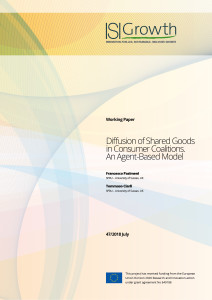In this paper we study the process of coalition formation conditioning the common decision to adopt a shared good, which is too expensive for one average consumer, who would also not be able to exhaust its use. We develop an agent based model to study the interplay between coalition formation and the diffusion of shared goods. We model coalition formation in an evolutionary game theoretic setting, and adoption using elements from the Bass and the threshold models. Coalitions formation sets the conditions for adoption, while diffusion influences the consequent formation of coalitions. Results show that both coalitions and diffusion are subject to network effects, which also have an impact on the information flow though the population of consumers. Consumers prefer to form large coalitions in order to buy expensive goods and share ownership and use, rather than establishing smaller coalitions. In larger groups the individual cost is lower, although it increases if higher quantities are purchased collectively. The paper concludes by connecting the model conceptualisation to the on-going discussion of diffusion of sustainable goods, discussing related policy implications.
Diffusion of Shared Goods in Consumer Coalitions. An Agent-Based Model
Francesco Pasimeni
SPRU – University of Sussex, UK
Tommaso Ciarli
SPRU – University of Sussex, UK

